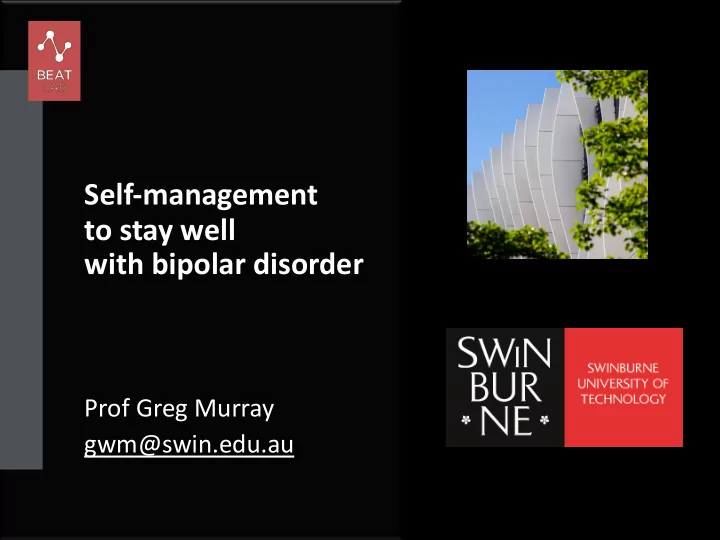

Self-management to stay well with bipolar disorder Prof Greg Murray gwm@swin.edu.au
Being knowledgeable about the disorder, and educating others What books, websites and other • resources have been particularly useful for your understanding of bipolar disorder? What is the most important thing • you thing people need to know if they have just been diagnosed with bipolar disorder? What is the most important thing • others need to know about bipolar disorder? How do you make sure others have • good quality information?
Ongoing monitoring of the disorder Do you use ongoing monitoring, to • help you judge when to make changes? What do you monitor? Behaviours, • physical feelings, mood, sleep? How frequently do you monitor? • Daily, more than daily, less? What technology do you use if any? • What have you learned from your • monitoring? Do you have a ‘relapse signature’ for • depression, mania or hypomania? Are there any downsides to • monitoring?
Connecting with family and friends What makes a good support for • someone with bipolar disorder? What makes someone not so good? • How do you like to balance solitary • and social time? Do you have the skills and resources • to improve relationships with others if you’re not getting what you need?
Maintaining regular sleep and activity How well do you sleep? • What’s the relationship between • sleep and mood in your experience? What about daily routines? How • stable are your social rhythms?
Collaborative relationship with the prescriber and other clinicians What’s the difference between a • good relationship with a prescriber and not so good? What other professionals and • supports do you have in place? Psychologist? Counsellor? Self-help group? What is your experience of inpatient • facilities and CAT? How can this be improved? What do you want clinicians to • understand about living with bipolar disorder?
Reflective and meditative practices Do you participate in meditation, • mindfulness, yoga, active relaxation? What benefits do you receive? • Are there any challenges or • downsides to reflective and meditative practices?
Having a plan to deal with early signs of relapse, and crises Do you have a plan if you recognise a • manic or depressive episode is on the way? Is the plan informal or a fully written • plan (e.g., WRAP)? Do others know about your plan, and • have they agreed to it clearly?
More information www.crestbd.ca/tools/bipolar-wellness- • centre www.bipolarlife.org.au/video-library/ • bipolarcaregivers.org •
Recommend
More recommend